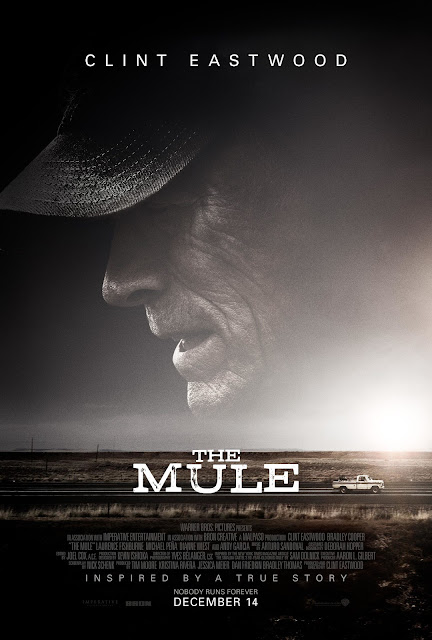The Mule (Film Review)

2018 Warner Bros. Pictures
Directed by: Clint Eastwood; Written by: Nick Schenk
Starring: Clint Eastwood, Bradley Cooper, Laurence Fishburne, Michael Peña, Dianne Wiest, and Andy García
MPAA Rating: R; Running Time: 116 Minutes
The Nicsperiment Score: 6/10
Clint Eastwood is back behind the camera for The Mule, directing himself for perhaps the last time in his storied career. Here, he's Earl, an aging florist who's dedicated his life to his craft, and neglected his now ex-wife and family. When I say aging, I really mean it: the guy's 90. Now, his daughter, whose wedding he missed, won't even talk to him, and his business is failing. His ex-wife is geographically close enough to tell him multiple times that he was never there for his family or her, in exactly those words, as The Mule likes to tell its drama just as much as it likes to show it.
After finding he may have to renege on an ill-advised promise that he'd pay for his granddaughter's wedding, Earl gets mixed up with the Mexican drug cartel. Turns out, as a life-long, law-abiding driver, and a Korean War vet, Earl is the perfectly non-suspicious person to traffic cocaine across the country in his old beat-up pickup truck--and the pay is great. Before you can count the dashes in the previous sentence, Earl is taking on additional drug-running jobs--after all, the local VFW's in poor shape, his granddaughter could use some college funding, and Earl could always use a new truck.
The film switches perspectives between Earl's under-the-speed-limit exploits and the DEA's attempt to find out how the heck the cartels are transporting so much cocaine across the country right under their noses. None of the DEA agents are given any depth, though The Mule attempts to draw parallels between the overworking Colin, played with trademarked Bradley Cooper everymaness by Bradley Cooper, and Earl when Earl was younger. Turns out, all this money Earl's making is getting him back into his family's good graces, and all the driving he's doing is giving him time to reflect on how pathetic of a husband and father he was. As tensions rise between Earl and the cartel, Earl must once again choose between work and family, but this time, with life-or-death consequences.
The Mule is matter-of-fact and nondescript to a degree that at times it hardly feels like a film. What's happening is what's happening, there are no twists, and any emotion, no matter how obvious, is bluntly stated by the characters. Moreover, Eastwood uses this film as one last chance to look tough and virile, and a couple of scenes that explicitly show how the wheezing Earl can still please multiple young lovers in the same night are more than a bit much.
However, perhaps due to the absolute granite wall of gravitas provided by a gnarled Eastwood, who has real-life blown through so many wives and lovers and produced so many children, his personal life has it's own Wikipedia page, the film still packs a bit of a punch. Even though it explicitly spells out every moral point it is attempting to make with its blunt dialogue, The Mule also pinpoints a fairly original flaw at Earl's core: Earl enjoys the little things in life too much.
This grievance immediately reminded me of my old college favorite, The Sun Also Rises. Hemingway's protagonist in that book, Jake Barnes, takes pleasure in all of the small things in life. A lazy fishing trip on the banks of a Spanish river is written as the most pleasing day in existence, as Jake enjoys the cool air, the rhythms of fishing, the pure tactile pleasure of wrapping fish in leaves to keep them fresh, wine chilled by the very river he's fishing from, and a nice siesta. I thought this extremely commendable, but The Mule posits that a life of nothing but enjoying the small moments precludes the chance to enjoy the big ones.


Comments